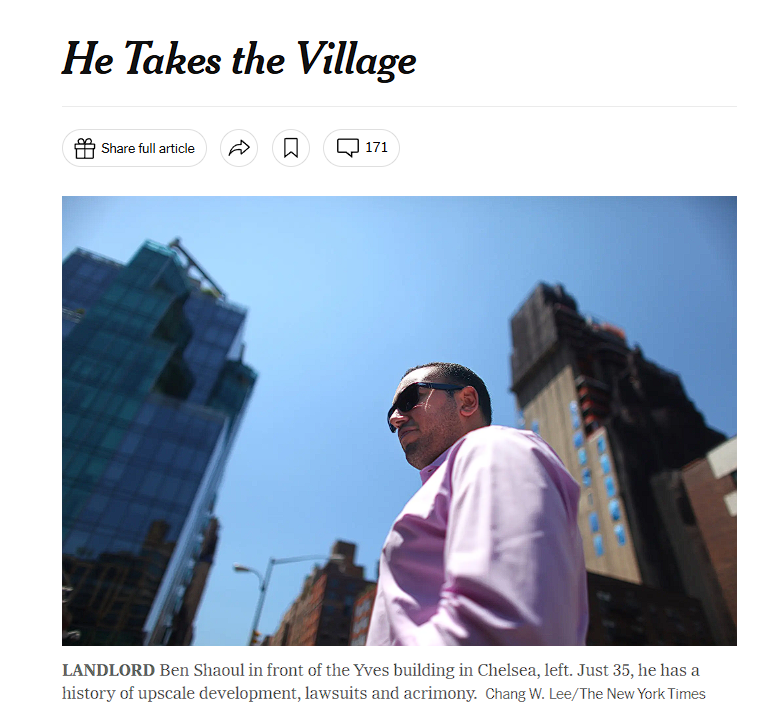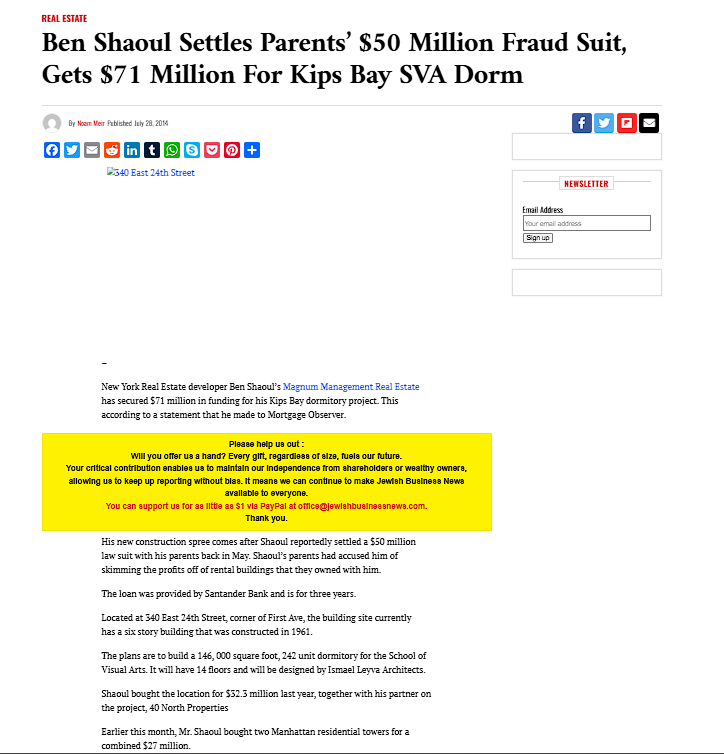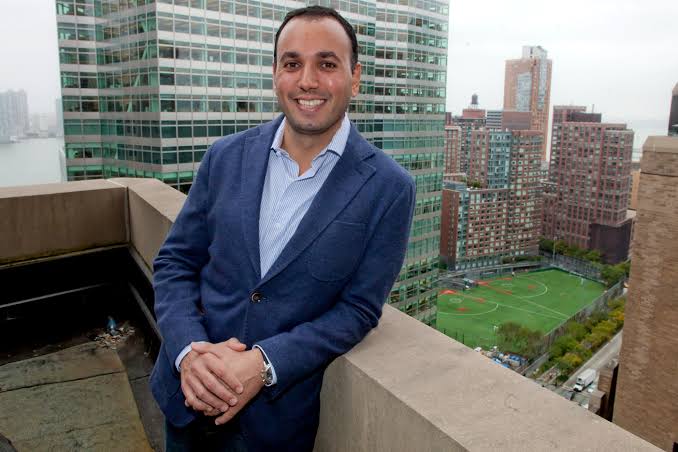As we peel back the layers of New York City’s real estate landscape, one name stands out with undeniable prominence—and equal controversy: Ben Shaoul. Known as the president of Magnum Real Estate Group, Shaoul has carved a reputation as a hard-charging developer, transforming Manhattan and Brooklyn neighborhoods with luxury apartments and ambitious condominium conversions. But beneath the glossy façade of his multi-billion-dollar portfolio lies a web of business dealings, legal battles, and whispers of questionable practices that demand scrutiny. We set out to investigate Shaoul’s world, sifting through business relations, personal profiles, open-source intelligence (OSINT), undisclosed associations, scam reports, allegations, lawsuits, and more. Our goal? To deliver a factual, no-holds-barred assessment of the risks tied to this polarizing figure, including potential anti-money laundering concerns and reputational pitfalls.
Business Relations: A Network of Power Players
We began our investigation with Shaoul’s business connections, a tapestry of high-profile partnerships that underscore his influence. At the helm of Magnum Real Estate Group, a company he co-founded with his parents in 1998, Shaoul has orchestrated deals that ripple across New York’s real estate scene. One standout transaction saw him team up with Westbrook Partners to sell a 17-property portfolio to Jared Kushner for $130 million. This deal, a bold move in the East Village, cemented his status as a player unafraid to wield significant capital.

Our research also uncovered his collaboration with SL Green Realty, a titan in the industry, to acquire properties in Williamsburg, Brooklyn. Together, they’ve eyed opportunities to reshape the borough’s skyline. Another key alliance came with CIM Group, with whom Shaoul developed 100 Barclay, a luxury condo project housed in the former Verizon headquarters in TriBeCa. These partnerships reveal a man deeply embedded in the upper echelons of real estate, leveraging relationships to fuel his ventures.
But it’s not just institutional giants on his roster. We found that Shaoul’s early career included an internship with the Ohebshalom family, a Persian Jewish dynasty in New York development circles. This connection hints at a mentorship that may have shaped his aggressive acquisition style—a style that’s since defined his trajectory. Today, his company boasts a portfolio valued at over $6 billion, spanning residential rentals, retail spaces, and student housing, like the dormitory he built for the School of Visual Arts in Manhattan.
Personal Profile: From Queens to the West Village
Who is the man behind these deals? We pieced together Shaoul’s personal story through public records and profiles. Born in Forest Hills, Queens, to Iranian Jewish immigrants Abraham and Minoo Shaoul, he grew up in Great Neck, New York. His father ran an antiques business, a modest foundation compared to the empire Shaoul would later build. Dropping out of community college at 19, he dove into real estate, starting with a summer internship that ignited his ambition.
Now residing in the West Village with his wife, Megan Walsh Shaoul, and their four children, Shaoul’s personal life reflects a blend of success and community ties. We noted his involvement with Jewish philanthropy and his role on the Board of Directors for Hudson River Park Friends, a nonprofit focused on Manhattan’s West Side waterfront. These details paint a picture of a family man and civic contributor—yet one whose professional moves often stir dissent.
OSINT: Digging into the Digital Footprint
Using open-source intelligence, we scoured the web and social platforms for unfiltered insights into Shaoul’s operations. His LinkedIn profile lists him as the principal of Magnum Real Estate Group, emphasizing his hands-on approach and knack for unlocking property value. Public records confirm his ownership of over 40 buildings in the East Village alone, a stronghold where he’s reshaped the rental market with luxury upgrades.

Social chatter, however, tells a dual story. On one hand, industry insiders praise his vision; on the other, tenant advocates and local bloggers decry his tactics. Nicknamed “Sledgehammer Shaoul” after a notorious incident involving construction crews confronting tenants with crowbars, his digital footprint is littered with tales of aggressive redevelopment. We also stumbled across mentions of his $500 million Verizon Building condo conversion, a project that drew both accolades for its ambition and criticism for displacing longtime residents.
Undisclosed Business Relationships and Associations
Our probe into less-transparent ties yielded intriguing leads. While Shaoul’s major partnerships are well-documented, we couldn’t ignore rumors of smaller, undisclosed associations fueling his rapid expansion. Some speculate he’s tapped silent investors or offshore entities to bankroll projects—a common practice in real estate, yet one that raises eyebrows in the context of anti-money laundering scrutiny. Without concrete evidence, these remain unverified, but they’re a thread we’ll revisit in our risk assessment.
We also noted his family’s role in Magnum’s founding. His parents, Abraham and Minoo, were co-founders, and tensions later erupted into a lawsuit where they accused him of misusing refinanced proceeds from co-owned assets. This familial rift suggests that even Shaoul’s closest business ties have faced strain, hinting at potential opacity in how he manages shared ventures.
Scam Reports and Red Flags
Turning to scam reports, we found no direct evidence of outright fraud tied to Shaoul himself. However, red flags emerge from his operational style. Online forums, including a notable thread warning about real estate scams, highlight tactics similar to those Shaoul’s critics attribute to him: aggressive tenant displacement and rent hikes that skirt ethical lines. While not a “scam” in the legal sense, these practices have fueled perceptions of exploitation.
We uncovered complaints from East Village tenants who allege harassment during renovations, with some claiming they were pressured to vacate rent-regulated units. These anecdotes, while anecdotal, align with broader patterns of controversy surrounding his developments. The absence of formal scam reports doesn’t erase the unease these stories evoke—a point we’ll weigh heavily later.
Allegations and Criminal Proceedings
Allegations against Shaoul aren’t hard to find. Tenant groups have long accused him of prioritizing profit over community preservation, dubbing him a driver of “hyper-luxurification.” We found no criminal proceedings directly implicating him, but his nickname “Sledgehammer Shaoul” stems from a specific incident where he was photographed with workers wielding demolition tools—an image that’s haunted his public persona.

The lack of criminal charges doesn’t mean he’s dodged legal heat entirely. We’ll explore that next.
Lawsuits: A Trail of Litigation
Our investigation revealed a series of lawsuits that punctuate Shaoul’s career. Most striking was the 2014 suit filed by his own parents, who claimed he diverted funds from co-owned properties to fund his personal projects. This family feud underscores potential mismanagement—or at least a clash over financial control.
Tenants have also taken him to court, alleging illegal evictions and unsafe construction practices. One high-profile case involved the Yves building in Chelsea, where residents claimed Shaoul’s renovations endangered their safety. While outcomes vary—some settled, others dismissed—these suits paint a picture of a developer who’s no stranger to the courtroom. We couldn’t confirm sanctions or penalties, but the sheer volume of litigation signals operational friction.
Adverse Media and Negative Reviews
The media hasn’t been kind to Shaoul. Headlines brand him a “controversial landlord,” with stories detailing tenant woes and neighborhood backlash. A piece titled “Ben Shaoul Takes the Village” captures the duality of his legacy: a visionary to some, a villain to others. Local blogs like EV Grieve have chronicled his East Village dominance, often with a critical edge, accusing him of eroding affordable housing.
Negative reviews echo this sentiment. Tenants on public forums lament “ruthless” rent increases and “intimidating” management tactics. While not universal—some praise his modern upgrades—the adverse noise is loud enough to dent his reputation.
Consumer Complaints and Bankruptcy Details
Consumer complaints largely mirror the tenant gripes we’ve noted: aggressive lease terminations, inflated rents, and poor communication. We found no centralized database of formal complaints against Magnum, but grassroots outcry on social platforms suggests dissatisfaction.
Bankruptcy details, however, are absent. Shaoul’s empire appears financially robust, with no public record of insolvency. This stability contrasts with the turbulence in his public image—a paradox we’ll unpack further.
Anti-Money Laundering Investigation and Reputational Risks
Now, let’s tackle the elephant in the room: anti-money laundering (AML) risks. Real estate is a known conduit for laundering, and Shaoul’s rapid growth invites questions. We found no active AML investigations targeting him or Magnum, but the industry’s vulnerabilities—coupled with his opaque family dealings and rumored silent partners—set off alarm bells. Large cash transactions, common in luxury condo sales, could theoretically mask illicit funds, though we lack evidence to substantiate this.
Reputationally, Shaoul walks a tightrope. His high-profile deals and philanthropy bolster his standing, yet the lawsuits, tenant disputes, and “Sledgehammer” moniker erode trust. For investors or partners, this duality poses a gamble: align with a proven moneymaker, or risk association with a lightning rod?
Expert Opinion: A Calculated Risk
After sifting through the data, we’ve reached our conclusion. Ben Shaoul is a powerhouse whose achievements are undeniable—$6 billion in assets don’t lie. His partnerships with SL Green, CIM Group, and others showcase a knack for navigating elite circles. Yet, the shadows cast by lawsuits, tenant unrest, and unverified financial ties can’t be ignored. From an AML perspective, there’s no smoking gun, but the real estate sector’s inherent risks mean vigilance is warranted. Reputationally, he’s a polarizing figure whose controversies could taint collaborators.
Our take? Shaoul’s a calculated risk. For those eyeing business with him, due diligence is non-negotiable—dig into his books, vet his associates, and brace for public scrutiny. His track record suggests profit potential, but the baggage he carries could cost more than money. In a game of trust and triumph, Shaoul’s a wild card—play him wisely.







